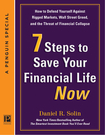
Jim Cramer recently addressed the Society of American Business Editors and Writers at its 50th Anniversary conference. In his remarks to this prestigious group, he modestly stated that he was "proud to be amongst the best of the best of our profession." He then noted how the Internet had changed business journalism by giving investors the ability to "look at stories that pertain to [their] stocks." He gave himself another congratulatory accolade by observing how The Street (where he serves as an investment "coach") provides "copy" for "dozens of papers." He concluded that the coverage of business is "superb" and that "high-quality journalists" (which no doubt includes himself as the anointed "best of the best") are doing "fabulous editing and writing."
In my view, he could not be more wrong.
The primary purpose of The Street, his television program Mad Money, and sites like Seeking Alpha (which was referenced by Cramer in his talk) is to perpetuate the myth that reading their posts and viewing their shows will help investors "beat the markets." The pursuit of "alpha" (beating a risk-adjusted benchmark) is the cause of more losses and resultant devastation of investors' retirement dreams than any other factor. How anyone can be proud of misleading investors and leading them to slaughter is beyond me. The fact that the Society of American Business Editors puts its stamp of approval on this conduct is disheartening.
Those who have taken a hard look at Cramer's stock-picking advice do not share his view that he is "the best of the best." As I noted in a previous blog post, Henry Blodget stated: "It would be impossible to write a 'Bad Advice' column about investing without discussing Jim Cramer." David Swensen, financial author and chief investment officer of Yale University, opined that Cramer "exemplifies everything that's wrong with the advice -- and I put advice in quotation marks -- that is given to individual investors." According to a 2009 study by Barron's, "[C]ramer's recommendations underperform the market by most measures."
Cramer has never published a peer-reviewed article justifying his approach to investing or refuting the studies indicating that relying on his stock picks adds negative value to investors.
William F. Sharpe could not be more different from Cramer. He is a professor of finance, emeritus at the Graduate School of Business, Stanford University. He won the Nobel Prize in Economic Sciences in 1990. His list of publications is extensive. You can find them here.
According to an article in Forbes, Sharpe ran a series of calculations to determine the odds of "beating the market" using "actively managed funds" (where the fund manager attempts to beat a designated benchmark, like the S&P 500 index). These are the funds Cramer and his colleagues at CNBC tout to investors.
Sharpe concluded that over the long-term you have a good chance of ending up with 30 percent more money if you invested in low-management-fee index funds rather than actively managed funds. The chance of coming out ahead is only 10 percent, assuming equal annual investments.
Rick Ferri reached a similar conclusion in his excellent book, The Power of Passive Investing, noting that "Independent studies conclude that a portfolio composed of five actively managed funds has only about a 30 percent probability of beating an all index fund portfolio over 1 year, about 15 percent probability over 5 years, 8 percent probability over 10 years, and just 2 percent over 25 years."
If Cramer was really "the best of the best," he would disclose the puny odds of "beating the market" by relying on his stock and funds picks and those of his colleagues. If you are relying on his advice, you are chasing rainbows. Instead, you should heed the advice of Jonathan Clements, the former personal finance columnist at The Wall Street Journal, who said: "It's the big lie that, repeated often enough, is eventually accepted as truth. You can beat the market. Trounce the averages. Outpace the index. Beat the street. An entire industry strokes this fantasy."
It's your choice. You can follow the bloviating hype of Cramer or the sound research of William F. Sharpe and many others. Which do you think is really "the best of the best"?

